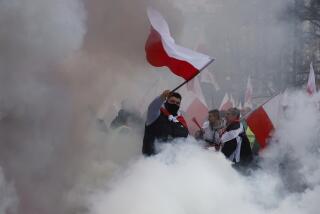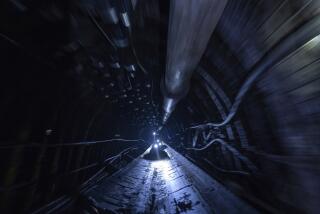Drivers, More Polish Miners Join Strikers
- Share via
WARSAW — Workers at three more Polish coal mines and bus and trolley drivers at a major Baltic port city were reported on strike Thursday as speculation mounted that another wave of labor unrest could be building in Poland.
The new strikes brought the number of work stoppages to seven in the past three days--five mines in the vital Silesian coal region around the southern city of Katowice and the port workers and drivers in Szczecin.
Activists of the banned Solidarity trade union said the lists of worker demands were led by political issues, including the reinstatement of Solidarity and calls for “trade union pluralism.”
Economic Demands Cited
Accounts in the official news media, however, stressed the economic demands of the workers, including, in some of the coal mines, pay increases of 100,000 zlotys (about $300) a month and retirement pay beginning at the age of 38.
The three new strikes in Silesia were at the Moszczenica mine near Jastrzebie, the Andaluzja mine in Jastrzebie and the Jastrzebie mine itself.
It was another mine in Jastrzebie, named July Manifesto, that was the first to go out Tuesday. It was followed early Wednesday by the Morcinek mine near the Czechoslovak border.
Port workers at Szczecin joined in later Wednesday, appointing a 15-man strike committee and declaring solidarity with the miners.
The Moszczenica coal mine is one of the largest in Poland, employing about 11,000 miners and other workers. Opposition activists said the strike there was started by about 1,000 night-shift miners.
Phone Links Cut
The authorities have blocked telephone communications with the mines and stationed cordons of police to prevent other miners from entering.
About 600 police were reported to be encircling the July Manifesto mine in Jastrzebie. Opposition sources said food deliveries to the mine were blocked by the police.
It was difficult to determine how many workers were involved in the strikes. About 4,000 miners were reported to be inside the July Manifesto mine, 400 in Morcinek and 2,000 in Andaluzja, in addition to the 1,000 at the Moszczenica mine.
In Szczecin, about 1,000 port workers and about 600 bus and trolley drivers were striking. The drivers’ strike caused major disruptions in the city, preventing thousands of workers from getting to their jobs.
In labor strikes in Poland, workers--rather than picketing and preventing entry in the style of Western unions--generally occupy the struck facility until negotiations with officials are concluded.
Poland’s Communist government, which put down a wave of strikes in April and May, is struggling to enact an economic reform plan promoted by the nation’s leader, Gen. Wojciech Jaruzelski. One result of the plan has been a skyrocketing inflation rate, which some foreign economic analysts say is now approaching 60%.
While Poland continues to stagger under a $38-billion foreign debt, few of the government’s economic measures have brought any financial relief to Poland’s 38 million citizens, who have been hearing about Jaruzelski’s plans for economic and political reform since 1982, when the general was installed during the period of martial law that brought an official end to the Solidarity trade union.
Major Export
Poland is the world’s fourth-largest exporter of coal, making the mines here the nation’s single most important industry. Also, other vital Polish industrial concerns--steel and shipbuilding--depend on supplies of coal to keep up production.
Another major labor upheaval here could spell the end to the Jaruzelski regime, which has been unable to reverse Poland’s sorry economic performance during the six years it has been in power.
More to Read
Sign up for Essential California
The most important California stories and recommendations in your inbox every morning.
You may occasionally receive promotional content from the Los Angeles Times.













